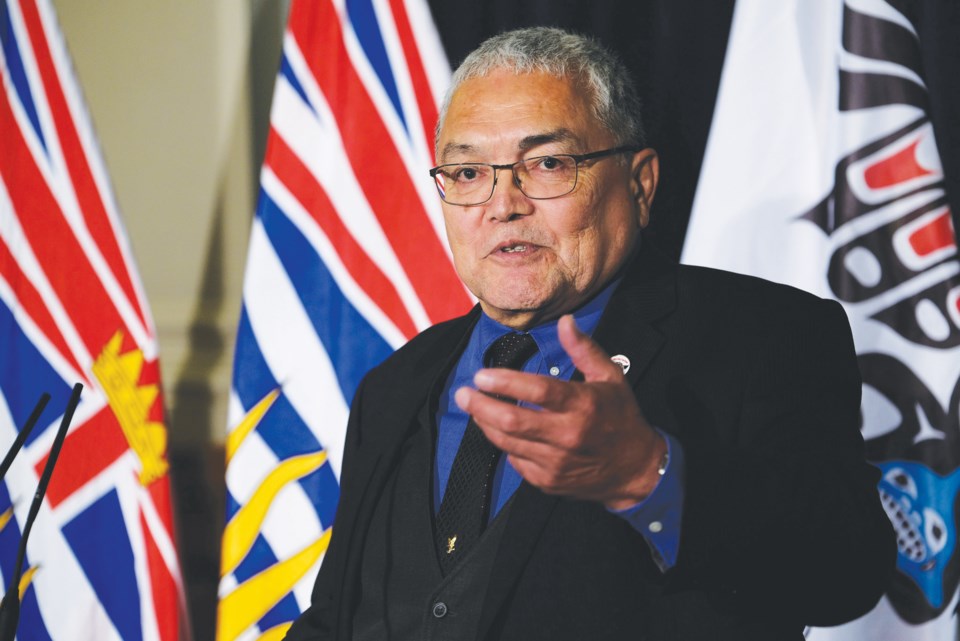An amendment to the self-government agreement between shíshálh Nation and Canada passed unanimously through the House of Commons June 22, slipping through just before the house rose for the summer.
But behind that moment – that vote – was years of work.
The first agreement
Thirty-six years ago, the shíshálh Nation was the first First Nation to sign a self-governing agreement with Canada. Several self-governing agreements would come after that, each learning from the last, but shíshálh’s was the first. Many of the clauses of that agreement were archaic, copy-pasted from the Indian Act and the Constitution, shíshálh Nation hiwus (Chief) Warren Paull told Coast Reporter, and needed modernization.
The new legislation clarifies that the nation can amend its own constitution without oversight and approval from the federal government – something subsequent self governing agreements included.
“It gives the nation much greater authority over things that only affect the nation,” said West Vancouver-Sunshine Coast-Sea to Sky Country MP Patrick Weiler.
Until last month, law changes had to go through not only a minister, but the governor in council, for approval. “That was not only a very cumbersome and long process, but it is also paternalistic, and arguably insulting for that approval to have to be sought,” said Weiler.
The legislation also, critically, establishes a land registry apart from the Indian Act Reserve Lands Register. “We have been very good at acquiring lands but we wanted to have it as additions to our current land holdings under 91 (24) [of the Constitution Act, 1867],” said Paull. “We can sell it, and it will go back to being provincial land, but while we own it, it becomes 91(24) addition to land reserves.”
The legislative amendment also confirms that the nation has law-making powers over social and welfare services, including child and family services.
Weiler says also that this updated legislation now means shíshálh language can be used in governance.
Foundation Agreement
The recent history of this agreement for Paull goes back to the landmark reconciliation Foundation Agreement signed between the nation and the province in 2018, which addressed land use planning processes, consultation on resources in shíshálh territory and more.
“If you want to have a conversation with the province and sign a groundbreaking arrangement, there are certain things like land transfer that require federal acquiescence and engagement,” said Paull. “So we knew that we had to get there.”
The nation talked with then-Attourney General Jodi Wilson Raybould and “just about everybody under the sun on that end of the world,” said Paull.
The folks in Ottawa and in Victoria were on-board. “It’s one of those really good news stories that everybody wanted to get engaged. It’s not often that you have every party in both provincial and federal government who want to work with you on these things,” said Paull.
Even at that, the amendment took years.
Eleventh hour
This latest bout of negotiations started in 2020. The amendment went to referendum for nation members last October, passing more than 80 per cent in favour, said Paull. But it still had to get through Ottawa.
The unanimity with which the legislation passed through the House of Commons is rare, said Weiler.
They introduced Bill S-10 to the Senate first, which it passed through in a day, one week before summer break. It took a coordinated effort between Weiler, the Minister of Crown-Indigenous Relations, Marc Miller, as well as the Parliamentary secretary, working through concerns and questions from other parties and caucus (including a conversation in French between Weiler and the Bloc Quebecois) – to get the bill through. It wasn’t until the early hours of June 22 that things clicked. The legislation passed that afternoon. Had the legislation not passed unanimously, it would have been referred to committees, debates, and three more readings.
“It is a very important change,” said Weiler. “And it's cause for celebration.”
“It’s taken a lot of effort, a lot of political will,” said Paull. He gave credit to Marc Miller, Weiler, MLA Nicholas Simons, and the previous ministers and politicians who came to the table in support.
This isn’t the end of negotiations though.
After the Foundation Agreement was finalized, negotiations between the nation and Canada were broken into three sections.
The first section was the election cycle. Before 2019, only nation members who lived on shíshálh territory could vote or run for office. As of 2019, non-resident members can also vote and run for office.
The second section is this recent amendment.
The third section has to do with the reconciliation table and negotiation on matters to do with land, taxation, management of natural resources and wildlife.
They have yet to sit down on those matters but are gearing up for it, said Paull.
For the people who live and breathe this stuff, this amendment is major, said Paull. “For the rest of them, the membership say it was about time. Long overdue.”
With this ability to amend the constitution, Paull says he has a lot of community members who want to get into that discussion in short order – it’s a matter of deciding what to do first.
“All those conversations are happening now.
“And the community is going to have to be consulted on all of it. Because it’s their constitution.”
“Now, we have to have a hard conversation around what's next,” said Paull. “Because now we're into expanding our influence outside of our traditional postage stamp lands and getting out into the greater community becoming a functioning governance model. So it requires a lot of discussion.
“It's a great time to be a shíshálh Nation member,” said Paull. “I think we're going to lead the way with the rest of Canada and show Canada how this is done.”



